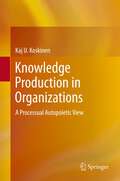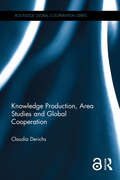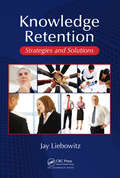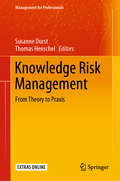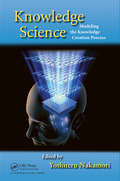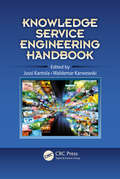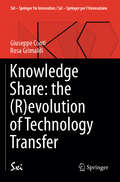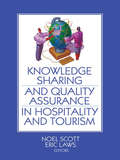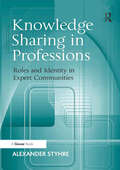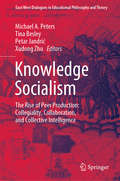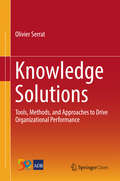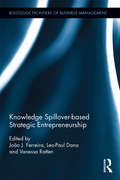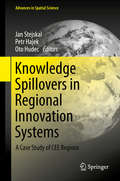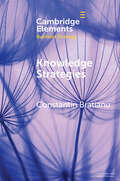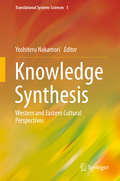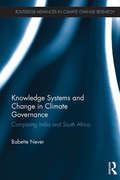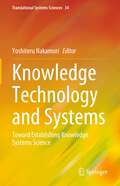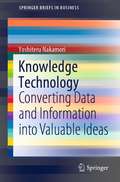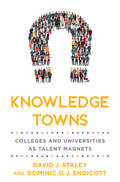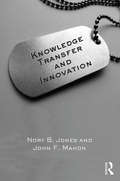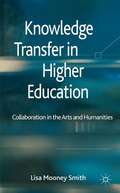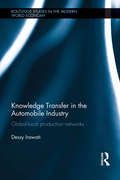- Table View
- List View
Knowledge Production in Organizations
by Kaj U. KoskinenThe systemic view provides a basic approach through which people may advance their understanding of knowledge production in organizations. One of the most important contributions to this systemic view is the theory of social autopoiesis which emphasizes that knowledge production of organizations can only be understood through the view of a social autopoietic system. Recent developments in the field of organization research have started to view organization as a process rather than as entity. The author combines in this book these two approaches - autopoietic systemic view and process thinking - in a way that organizations are seen as processual autopoietic systems.
Knowledge Production, Area Studies and Global Cooperation (ISSN)
by Claudia DerichsWhereas Area Studies and cross-border cooperation research conventionally demarcates groups of people by geographical boundaries, individuals might in fact feel more connected by shared values and principles than by conventional spatial dimensions. Knowledge Production, Area Studies and Global Cooperation asks what norms and principles lead to the creation of knowledge about cross-border cooperation and connection. It studies why theories, methods, and concepts originate in one place rather than another, how they travel, and what position the scholar adopts while doing research, particularly ‘in the field’.Taking case studies from Asia, the Middle East and North Africa, the book links the production of alternative epistemologies to the notion of global cooperation and reassesses the ways in which the concept of connectedness can be applied at the translocal and individual rather than the formal international and collective level.Knowledge Production, Area Studies and Global Cooperation provides an innovative and critical approach towards established means of producing knowledge about different areas of the world, demonstrating that an understanding of pluri-local connectivity should be integrated into the production of knowledge about different areas of the world and the behavioural dimension of global cooperation. By shifting the view from the collective to the individual and from the formal to often invisible patterns of connectedness, this book provides an important fresh perspective which will be of interest to scholars and students of Area Studies, Politics, International Relations and Development Studies. The Open Access version of this book, available at http://www.taylorfrancis.com, has been made available under a Creative Commons Attribution-Non Commercial-No Derivatives (CC-BY-ND) 4.0 license.
Knowledge Retention: Strategies and Solutions
by Jay LiebowitzAs the baby boomer generation approaches retirement age, many organizations are facing the potential crisis of lost knowledge. Devised to help those organizations who are dependent on the accumulated knowledge of stakeholders, this book details a proactive approach to knowledge retention. Written by Jay Liebowitz, one of the most sought after knowledge management experts, this text explains how to identify at risk knowledge areas, and then demonstrates how to keep those areas from becoming knowledge vacuums. To reinforce his points, the book contains case studies from The Aerospace Corporation, Chevron, and Knowledge Harvesting Inc., who have become models for the implementation of knowledge retention strategies.
Knowledge Risk Management: From Theory to Praxis (Management for Professionals)
by Susanne Durst Thomas HenschelThis book provides an in-depth introduction to knowledge risk management (KRM) as well as methods, tools and cases to address knowledge risk management issues in both the public and private sector. It focuses on the integration of knowledge risks into the holistic risk management of organizations. In addition, this book is accompanied by an external website that includes additional checklists, videos and company cases. The combination of a sound theoretical framework along with practical instruments, tools and ancillary materials makes this book a unique, interactive book for professionals, managers, and executives as well as students, academics and policy makers.
Knowledge Science: Modeling the Knowledge Creation Process
by Yoshiteru NakamoriExplaining how to improve our knowledge-based society, this book addresses problems in collecting, synthesizing, coordinating, and creating knowledge. It provides knowledge engineering tools and a framework for integrating knowledge creation, discovery, and management. The text covers knowledge technology, knowledge management, knowledge discovery and data mining, knowledge synthesis, knowledge justification, and knowledge construction. Experienced researchers in decision science, artificial intelligence, systems engineering, behavioral science, and management science present new methods for creating technological innovation from existing knowledge, such as IT techniques, organizational theory, and mathematical systems theory.
Knowledge Service Engineering Handbook (Ergonomics Design & Mgmt. Theory & Applications)
by Waldemar Karwowski Jussi KantolaEdited by Jussi Kantola, the founding faculty member of the world's first university Knowledge Service Engineering Department at Korea Advanced Institute of Science and Technology, and Waldemar Karwowski from the Department of Industrial Engineering and Management Systems at UCF, Knowledge Service Engineering Handbook defines what knowledge service
Knowledge Share: the (SxI - Springer for Innovation / SxI - Springer per l'Innovazione #16)
by Giuseppe Conti Rosa GrimaldiThe book is the outcome of a thoughtful reflection on Knowledge Share (KS), encompassing the distribution, connection and co-production of knowledge, through a circular, multi-sourced and multidirectional process. The book aims to generate in-depth knowledge and better awareness of the phenomenon, as well as new ideas and concrete actions to favour KS. It offers a comprehensive view of the factors influencing KS, including environmental, organizational, individual factors and their interrelations. The book is structured so to stimulate a reflection on theories and models of KS and to provide some evidence with a specific emphasis on the Italian context. This book talks to people interested in creating the conditions in which effective knowledge share (KS) can happen. It intends to reach out to different communities, raise awareness around KS and hopefully trigger a conversation that will result in a better understanding of KS dynamics now and in the future.
Knowledge Sharing and Quality Assurance in Hospitality and Tourism
by Eric Laws Noel ScottLearn both theory and practice of knowledge managementSir Francis Bacon once wrote, "Knowledge is power." Knowledge Sharing and Quality Assurance in Hospitality and Tourism provides strategies to grab that power and the competitive edge in the tourism industry through knowledge management (KM) and quality assurance. Leading tourism and hospitality experts offer the latest theory and practical frameworks to expand the knowledge needed for creating and maintaining success at destinations around the world. Each cogent chapter provides fresh directions for future research and the creation of effective ways to share and use knowledge.As the tourism and hospitality industry expands, the competition increases as the search continues for ways to ensure quality, know the consumer, and discover the best standards of destination operation. Knowledge Sharing and Quality Assurance in Hospitality and Tourism is a unique foundational text that clearly explains the theory and practical management of knowledge in this lucrative, very competitive industry. Knowledge theory is used to explore organizational functioning, change issues, and operations at destinations in industry clusters and networks. Chapters are extensively referenced. Topics in Knowledge Sharing and Quality Assurance in Hospitality and Tourism include: the role of higher education in transferring knowledge into practice four kinds of benchmarking e-mail response quality quality management at the destination level and its path to knowledge sharing tourism managers knowledge needs-the knowledge type, where the knowledge is available, and sharing that knowledge between academics and the industry strategic planning in knowledge management three element framework of knowledge management assessment a case study of an international tourism project and the use of knowledge management a case study of best practice in tourism research dissemination in Quebec and QueenslandKnowledge Sharing and Quality Assurance in Hospitality and Tourism is crucial, idea-sparking reading perfect for tourism researchers, tourism managers, administrators, educators, and students.
Knowledge Sharing at REMA 1000 (A)
by Tatiana Sandino Olivia HullA year after Norwegian grocery chain REMA 1000 adopted Workplace, Facebook's corporate social media network, CHRO Tore Hoylie is asked to evaluate its impact on company culture and communication. Almost 90% of the workforce is engaged with the platform, which they use to communicate with colleagues across the decentralized chain of independent outlets. However, there are some concerns that the site is overloaded with information and difficult to navigate. Hoylie must decide whether to try to improve the platform or look for an alternative. If REMA keeps Workplace, how can REMA improve the way employees interact with it?
Knowledge Sharing at REMA 1000 (A)
by Tatiana Sandino Olivia HullA year after Norwegian grocery chain REMA 1000 adopted Workplace, Facebook's corporate social media network, CHRO Tore Hoylie is asked to evaluate its impact on company culture and communication. Almost 90% of the workforce is engaged with the platform, which they use to communicate with colleagues across the decentralized chain of independent outlets. However, there are some concerns that the site is overloaded with information and difficult to navigate. Hoylie must decide whether to try to improve the platform or look for an alternative. If REMA keeps Workplace, how can REMA improve the way employees interact with it?
Knowledge Sharing at REMA 1000 (B)
by Tatiana Sandino Olivia HullSupplement to Knowledge Sharing at REMA 1000 (A). Chief Human Resources Officer Tore Høylie was proud of REMA 1000 (REMA)'s strong employee engagement with Workplace, Facebook's corporate social media platform, however some users complained that the corporate social network had disrupted hierarchical structures, and that the site was overloaded with information. To begin to remedy these problems, Høylie's team modified the group architecture and issued guidance for platform use.
Knowledge Sharing in Professions: Roles and Identity in Expert Communities
by Alexander StyhreNo professional is an island. Despite their capacity to monopolize and erect entry barriers in terms of either formal credentials or membership of certain organizations, professionalism is inextricably bound up with collective accomplishments on a day-to-day basis and the capacity to share all the resources that constitute the professional domain of expertise. Knowledge Sharing in Professions looks at professionalism as a form of systematic and institutionalized knowledge sharing. It analyses professionalism through the everyday practices in professional communities and the organizations where they work. Three empirical studies, of pharmaceutical clinical trials researchers, management consultants, and architects, are presented, serving to illustrate the relational nature of these and other professions, and how members of professional communities are constantly exchanging data, information, and know-how in their everyday work. Alexander Styhre seeks to understand the role of professions and other forms of experts in contemporary society on the basis of complementary perspectives, that is to say, the communal and collegial nature of professional work. This book represents a valuable contribution both to the sociological literature on professions and the business orientated literature on knowledge management and should promote further new research on professionalism.
Knowledge Socialism: The Rise of Peer Production: Collegiality, Collaboration, and Collective Intelligence (East-West Dialogues in Educational Philosophy and Theory)
by Michael A. Peters Xudong Zhu Petar Jandrić Tina BesleyThis is the first collection focusing on knowledge socialism, a particularly apt term used to describe a Chinese socialist mode of production and socialist approach to development and modernity based around the rise of peer production, new forms of collaboration and collective intelligence. Making the case for knowledge socialism, the book is intended for students, teacher, scholars and policy theorists in the field of knowledge economy.
Knowledge Solutions
by Olivier SerratThis book is open access under a CC BY-NC 3. 0 IGO license. This book comprehensively covers topics in knowledge management and competence in strategy development, management techniques, collaboration mechanisms, knowledge sharing and learning, as well as knowledge capture and storage. Presented in accessible "chunks," it includes more than 120 topics that are essential to high-performance organizations. The extensive use of quotes by respected experts juxtaposed with relevant research to counterpoint or lend weight to key concepts; "cheat sheets" that simplify access and reference to individual articles; as well as the grouping of many of these topics under recurrent themes make this book unique. In addition, it provides scalable tried-and-tested tools, method and approaches for improved organizational effectiveness. The research included is particularly useful to knowledge workers engaged in executive leadership; research, analysis and advice; and corporate management and administration. It is a valuable resource for those working in the public, private and third sectors, both in industrialized and developing countries.
Knowledge Spillover-based Strategic Entrepreneurship (Routledge Frontiers of Business Management)
by João J. Ferreira Vanessa Ratten Leo-Paul DanaThis book is about the role of knowledge spillovers and strategic entrepreneurship in the management context. It focuses on how knowledge spillovers and strategic entrepreneurship are crucial to the process of creative destruction and construction. The book aims to provide insights into and discussion on how firms combine entrepreneurial action that creates new opportunities for industries, regions and economies. This book is first of its kind to link knowledge management perspectives to strategic entrepreneurship to understand the co-creation process. Being interdisciplinary in nature, this book appeals to entrepreneurship and knowledge management scholars, students and practitioners.
Knowledge Spillovers in Regional Innovation Systems: A Case Study Of Cee Regions (Advances in Spatial Science)
by Jan Stejskal Petr Hajek Oto HudecThis book provides an assessment of the evolution and dynamics of regional innovation systems (RISs) and the economic and social impact of resulting knowledge spillovers, presenting comparative case studies on the regions of several Central and Eastern European (CEE) countries (Czech Republic, Poland, Hungary, Slovakia, Lithuania and Estonia).It analyses RISs on the basis of several dimensions, such as absorption capacity and intellectual capital, and using several methods such as data envelopment analysis, patent network analysis, and weighted sum approach.Further, by looking at the economic and social impact of knowledge spillovers in RISs and networking, it identifies key distinguishing factors, including foreign direct investments, still prevalent centralized decision-making, EU-driven innovation policies and public financing of innovations. Sectoral case studies, e.g. from the automobile, chemical and other hi-tech manufacturing industries, are presented to help readers understand the different types of knowledge spillovers in CEE countries and the evolution and dynamics of RISs, and provide a multifaceted overview of the CEE regions.
Knowledge Strategies (Elements in Business Strategy)
by Constantin BratianuKnowledge is a strategic resource of any organization and its deployment is critical in achieving a sustainable competitive advantage. Knowledge strategies were born at the intersection of strategic thinking and knowledge management. Strategic thinking is a mental process of understanding the future and, based on that understanding, of searching for practical ways of achieving a competitive advantage on the market. Strategic thinking is operating in the opportunity space of the organization. The book explains the strategizing process and presents the knowledge strategies as a result of that complex mental process. Organizations can design deliberate and emergent knowledge strategies, which can be integrated into the corporate vision and its strategies.
Knowledge Synthesis
by Yoshiteru NakamoriThis book provides readers the idea of systemically synthesizing various kind of knowledge, which needs to combine analytical thinking and synthetic thinking. Systems science is expected to help in solving contemporary complex problems, utilizing interdisciplinary knowledge effectively and combining analytical thinking and synthetic thinking efficiently. However, traditional systems science has been divided into two schools: one seeks a systematic procedure to give a correct objective answer; the other develops an emergent, systemic process so that the user can continue exploratory learning. It is not an exaggeration to say that analytical thinking and synthetic thinking have been developed independently, in different schools. This book integrates approaches developed in these two schools, using ideas in knowledge science that have been emerging recently under the influence of Eastern thinking. It emphasizes the importance of utilizing intuition in systems approaches, whereas other books usually try to solve problems rationally and objectively, rejecting subjectivity. This book never denies rationality and objectivity; however, complex problems of today do not always yield to complete analysis. The novelty of this present volume is that it takes in the ideas of synthetic thinking in knowledge science to develop systems science further. The chapter contributors, who are experienced systems scientists with a profound understanding of knowledge management, discuss knowledge synthesis from the Western and Eastern cultural perspectives. The book introduces a theory on systemic knowledge synthesis in an odd chapter and then presents an application of the theory in the next chapter in order to contribute to developing translational systems science.
Knowledge Systems and Change in Climate Governance: Comparing India and South Africa (Routledge Advances in Climate Change Research)
by Babette NeverThe success of international efforts to manage climate change depends on the participation of emerging economies. This book uses a comparative study of two of the most important, India and South Africa, to reveal new insights into managing climate change on a global scale. The book provides a unique in-depth analysis of how these two countries are dealing with climate change at both national and province levels, from India’s advances in solar and wind energy development to South Africa’s efforts to introduce a carbon tax. Using the innovative theoretical framework of climate knowledge systems, it explores how people in India and South Africa engage with one other, learn and act by forming communities of practice. The book identifies the drivers and barriers of climate governance, showing how different forms of scientific, technological, normative and pragmatic knowledge can aid climate governance and analysing how the underlying mind-set that guides climate action in these countries is changing. This book is a valuable resource for students and scholars of environmental policy, politics and governance, as well as comparative politics, climate change and sustainable development.
Knowledge Technology and Systems: Toward Establishing Knowledge Systems Science (Translational Systems Sciences #34)
by Yoshiteru NakamoriThis book discusses technology and systems to create valuable ideas from data through the construction of knowledge. The primary concern is to make better decisions about economic and management issues in today’s information-flooded society. Human creative activity is in the realm of soft technology, with no physical entity to operate. Focusing on the ability of knowledge as judgment power, this definition results: “Knowledge technology is soft technology that underpins the human creative activities of converting data and information into knowledge, creating new ideas based on that knowledge and validating those ideas.” That definition includes a wide range of soft technologies developed in informatics, management studies, and systems science. The knowledge system creates ideas from data and knowledge through knowledge technologies. Based on the proposition that knowledge emerges by the interaction between explicit and tacit knowledge, another definition is possible: “The knowledge system is a system that promotes interaction between codified and personalized knowledge and creates ideas for solving a specific problem.” Codified knowledge includes data and information, while personalized knowledge is empirical knowledge or wisdom that is difficult to put into words. Building a knowledge system requires mathematical or intelligent knowledge technology and participatory knowledge technology to create or manage codified knowledge and personalized knowledge. For example, a company builds cross-sectional knowledge systems by gathering human resources from various departments, according to the purpose, as in new product development or sales promotion. Chapter 1 defines knowledge technology and the knowledge system and organizes the challenges in their development, while Chapters 2 through 9 introduce mathematical or intelligent knowledge technologies by researchers at the forefront of knowledge technology development.
Knowledge Technology: Converting Data and Information into Valuable Ideas (SpringerBriefs in Business)
by Yoshiteru NakamoriThis book reviews creative technologies that underpin the human activities of converting data and information into knowledge, creating new ideas based on that knowledge, and validating those ideas. The book calls such creative technology “knowledge technology” and explores its challenges in the age of big data. Today, artificial intelligence and big data are successfully performing pattern recognition and decision making on behalf of humans, who are incapable of processing large amounts of information instantly and accurately. In using only past data, however, there are limits to future predictions with artificial intelligence and big data. Humans need to take the lead in predicting or creating the future by trying to understand why data emerged. Knowledge technology contributes to that understanding, regardless of the field of origin. As a matter of fact, knowledge technology includes many technologies developed in informatics, management study, and systems science. The desirable features of knowledge technology are the complementary use of rational and intuitive approaches, the integration of results from quantitative and qualitative analyses, and the cooperation between artificial intelligence and humans.
Knowledge Towns: Colleges and Universities as Talent Magnets (Higher Education and the City)
by David J. Staley Dominic D. EndicottThe remote work revolution presents a unique opportunity for higher education institutions to reinvent themselves and become talent magnets.In Knowledge Towns, David J. Staley and Dominic D. J. Endicott argue that the location of a college or university is a necessary piece of any region's effort to attract remote knowledge workers and accelerate economic development and creative placemaking. Just as every town expects a church, bank branch, post office, and coffeehouse, Staley and Endicott write, we will see a decentralized network of institutions of higher education flourish, acting as cornerstones for the post-pandemic rebuilding of our society and economy. In calling for a "college in any town," they are not simply proposing placing a traditional college within a town or city, but envisioning instead a particular kind of higher education institution called a "knowledge enterprise." In addition to providing the services of a traditional college, a knowledge enterprise acts as a talent magnet, attracting workers looking to move to cheaper and more attractive destinations.With the post-COVID-19 shift to more remote work, and millions of people moving to more affordable and livable cities, a place that wants to attract talent will require a thriving academic environment. This represents a new opportunity for "town and gown" to create collaborative communities. The pandemic has accelerated existing trends that put at risk the viability of many colleges and universities, as well as that of many towns and cities. The talent magnet strategy outlined in this book offers colleges and towns a plan of action for regeneration.
Knowledge Transfer and Innovation
by Nory B. Jones John F. MahonThis book demonstrates how managers can use and transfer knowledge more effectively to stimulate innovation in their organization in order to increase their competitive advantage. Jones and Mahon draw on their discussions with combat Veterans, whose very survival relies on their skill in transferring crucial knowledge and information quickly, effectively and efficiently. They note that in today’s competitive and fast-paced business world, these skills translate into continual innovation, metamorphosis,and ultimately success. The authors have built a conceptual framework that demonstrates to the reader how to develop the same underlying skills and to use them effectively in the business environment. With rich and lively examples throughout, Knowledge Transfer and Innovation equips students and practitioners of knowledge management, innovation, leadership and strategy with the skills, tools and strategies to succeed in today’s fast-paced business environment.
Knowledge Transfer in Higher Education
by Lisa Mooney SmithA presentation of four years of close observation of research and knowledge transfer practices in a university. It attempts to contextualise knowledge transfer within the arts and humanities, as well as situate learning about the reception and adoption of it by the individual scholar and the organisation in which they operate.
Knowledge Transfer in the Automobile Industry: Global-Local Production Networks (Routledge Studies in the Modern World Economy)
by Dessy IrawatiThe book arose from a multi-disciplinary study which looked at the development of global-local manufacturing clusters in the context of a developing, Asian economy. The study demonstrates the connection amongst theoretical perspectives such as international business, development studies, economic geography, and organisational learning clusters/production networks through an in-depth case study of the Indonesian automotive cluster. The book gives a detailed account of two automotive clusters (Toyota and Honda) and their contribution to regional economic development in emerging economies in Asian region. The book builds on existing literature to develop a theoretical framework to shed light on the study's empirical findings. The book discusses practical implications for both the business community and policy makers. The discussion on global-local networks in an Asian context supplements existing literature and case studies in the field. This is one of the few books that explicitly links regional clusters to global networks. The book offers a refreshingly international (Asian) perspective to the literature on clusters and economic geography for emerging economies.
